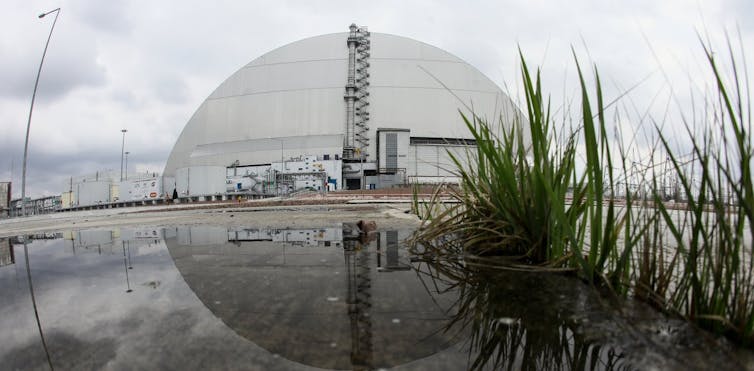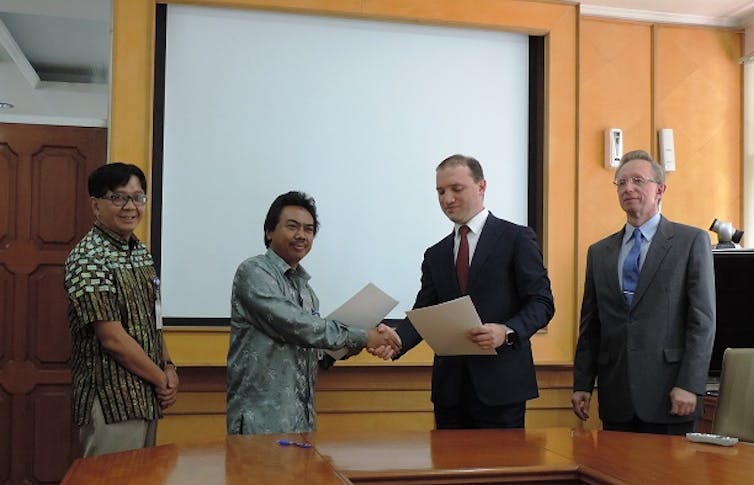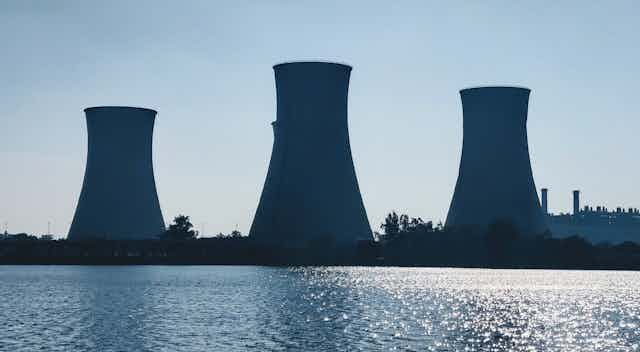In 2011, as Indonesia planned to start a nuclear energy program, a giant warning sign crashed in from Japan: the Fukushima nuclear disaster. The disaster was triggered by a gigantic tsunami and it resulted in a broadcast of radioactive pollution over a stretch of Japan’s countryside and across the Pacific Ocean.
As Fukushima fades into the past, Indonesia, Southeast Asia’s largest economy, wishes to forge ahead with nuclear energy. The government plans to use the first nuclear power plant to supply national electricity by 2040.
However, there is another great warning sign about Indonesia’s nuclear option, this time coming from Europe. The Russian invasion of Ukraine highlights how nuclear sites are an attractive and easy target for an enemy or invader. Over the past month, Russian troops have attacked then took charge of a number of nuclear plants in Ukraine.
I believe the Russian invasion should be an additional factor for Indonesia to rethink its nuclear energy project.
Lesson from Chernobyl

Indonesia isn’t likely to go to war with anyone anytime soon. However, some parts of the archipelago could be embroiled in an Asia-Pacific conflict if, for instance, China emulates Russian imperialism and pushes to conquer Taiwan. This would bring China into direct conflict with the US and Australia in nearby waters.
Whether or not Indonesia takes a side, it might still be dragged into a war as a perceived ally or enemy, or as an intermediary war zone. In Europe, right now, Belarus, Poland and Moldova are being dragged into the Russia–Ukraine war as they seek to navigate tense relations with allies and foes.
Also right now in Europe, the spectre of a “new Chernobyl” is rapidly emerging as Russia targets Ukraine’s various nuclear plants. Ukraine’s Chernobyl was the site of the world’s worst nuclear disaster in 1986 (at the time, Ukraine was part of the Soviet Union). More than 350,000 people were evacuated during the disaster and managing it has cost upwards of US$235 billion.
According to Greenpeace, a full military assault by Russia on Ukraine’s nuclear reactors could produce a catastrophe even greater than Chernobyl, rendering large swathes of Europe uninhabitable for decades.
Many might believe Russia’s army won’t be so reckless as to fire missiles directly at Ukraine’s nuclear plants. But I am not so sure. The Russian army might very well shrug off the risk of widespread radiological pollution if it thought firing upon a nuclear plant would give it some strategic or territorial gain.
Soviet-era relics like President Putin often regard the Chernobyl disaster as a small blip on the vast landscape of the “Russian World”. Younger Russians, too, seem only aware of the Chernobyl disaster via the popular American TV Series Chernobyl.
What this means is President Putin will likely underestimate the risk and danger of directly bombing Ukrainian nuclear plants.
If the Russian army finds no reason to launch missiles at Ukrainian nuclear plants, it may still use Ukrainian nuclear fears for tactical gain.
This appears to have happened already. When unarmed civilian protesters stood blocking a Russian column of troops as it moved toward the Zaporizhzhia plant, they faced off against each other for many hours. The Ukrainians only gave way when the Russian soldiers said they might use weapons against the plant if they could not access it peacefully. To avoid a nuclear disaster, the Ukrainian civilians stood down.
The Russian army ended up firing toward the plant anyhow, and threatened to compromise the plant’s safety systems if Ukrainian operators did not do exactly as they were told. Wildfires begun by Russian shelling are also threatening the Chernobyl plant.
So far during the war, a nuclear catastrophe in Ukraine has been avoided. However, if the war starts to go very badly for Putin, he might think about sabotaging Ukraine’s nuclear facilities in retribution. It seems the Russian army has employed terror tactics and has been accused of war crimes already. The army may not be averse to applying the same to nuclear sites just because Europeans are, in its eyes, overly sensitive to radiation.
Forget nuclear plan to encourage a clean fight
What all this means for Indonesia is that a new nuclear power plant might be an “own goal” from a security or military perspective.
Nuclear plants have an operating lifespan of 40 or more years. However, if you count leftover nuclear waste, this lifespan extends to hundreds or even thousands of years.
Over these timescales, it is likely Indonesia will be at war with someone or other – even if it is just as an ally. Indonesia’s nuclear plants might then be used against itself, either as radiological bomb-targets, or as sites of terror to manipulate the Indonesian government.
Even if Indonesia does avoid war with other nations over the long lifetime of a nuclear plant, the plant will still be vulnerable to terrorist attack. A foreign or homegrown terrorist would not need to launch a missile at an Indonesian power plant to create a nuclear disaster – they might just steal a civilian aircraft and crash into it at high speed.

Russia is also a leading candidate to be Indonesia’s nuclear supplier state, supplying the nuclear fuel for those plants, and providing technical and safety advice to Indonesia.
Given the way Russia has entangled and manipulated Ukraine through threats against nuclear safety during the current conflict, Indonesia might be exposing itself to a similar pattern of abuse in any nuclear dealings with Russia.
Even if Indonesia and Russia remain friendly, Russia’s state-sponsored nuclear business goes through highs and lows every time Russia engages in a foreign conflict.
This can pile pressure on commercial relationships with customer countries, including Indonesia. In the short term, the pressure could endanger the successful or safe completion of a Russian nuclear plant in Indonesia. In the long term, this could affect plant operation and maintenance, including nuclear waste management.
Ukraine is facing extreme versions of such problems with an aggressive Russia presently, as it fights for independence in a nuclear-tainted land. The clear message for Indonesia is this: it is best to forget about nuclear energy altogether if you want to encourage a clean fight in the future.

